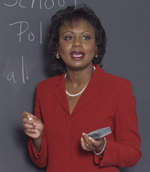Heller School course covers policy creation, in real time
Anita Hill leads her students into a social justice discussion where the topic is constantly evolving

Anita Hill
Historical perspective always helps when it comes to academic analysis, but students in last semester’s Heller School course, “Social Justice and the Obama Administration,” didn’t have that option. They were digesting the Congressional debate over national health care proposals live, as it happened.
“We were working with a moving target. Nothing was set in stone,” professor Anita Hill says. “But that made it very dynamic, and it gave us a chance to see how policy gets made in real time.”
Health care was one of three major policy initiatives, along with economic recovery for workers, and education, that Hill’s class critiqued and analyzed in terms of their ability to achieve a social justice end. She says the idea for the course was sparked by President Obama’s campaign for change and hope.
“I thought we had to take advantage of this time, and incorporate that into our learning to give students an opportunity to appreciate the time not just for what they read in the newspaper, but for the way they’re going to be thinking about their world and their work in the future,” Hill says.
Because the subject matter was changing daily, Hill says the course was truly a collaborative learning process. She provided background materials, but everyone was reacting to the policy process together. On several occasions throughout the semester, outside experts also offered their perspective on what was happening at the moment.
“The class had to be flexible and responsive to daily news reports, studies, and political announcements,” says Jonah Seligman ‘10. “Literally, I worked on a group presentation on health care reform that had to be altered the night before because of developments in the Congress over the public option.”
The course gave undergraduates like Seligman the opportunity to learn and engage with graduate students and PhD candidates, as well as retired Heller professor and WSRC scholar Hilda Kahne, who audited the course. Hill says Kahne’s training as an economist provided invaluable context as to where current policy proposals fit with earlier initiatives.
“Students had a lot of different backgrounds and interests in terms of what they wanted to do, and what they’ve already done,” Hill says. “Everyone talked and had ideas. They had criticisms, and they were well founded. They weren’t just gut reactions.”
Jodi Sperber, a first year doctoral student in the Heller School’s Health Policy concentration, says she signed up for the class not knowing what to expect, but recognized that it was a timely course that might not be offered again. “Professor Hill gracefully managed to wrangle a bunch of talkative students and push us to think deeper on a wide range of topics,” Sperber says.
To achieve such comprehensive in-class consideration, Hill encouraged Sperber and her classmates to absorb information from as many sources as possible. “I didn’t just want them to hear what the president or a particular political party was saying,” Hill says. “I wanted them to consider what the general population was saying, and what groups like the medical profession and insurance companies had to say. All of these players were part of the discussion. It was difficult, but that’s what made the course important and frankly a lot of fun at times.”
For Adam Michael Rosenberg, a dual-degree M.A. candidate in Sustainable International Development, and Coexistence and Conflict, the class also served as a wake-up call. “Having come to Brandeis just two weeks out of the Peace Corps, I quickly realized that I was way out of touch with domestic policy,” Rosenberg says. “I benefited greatly by listening to, and occasionally debating, my fellow classmates. This class was a defining moment, for many of us, in our Brandeis experience.”





